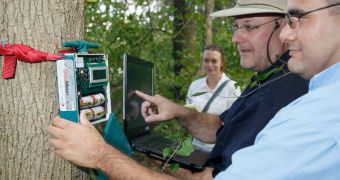Understanding ecosystems and landscapes is a critical part of ecology, the science of the relationships forming in our environments. Experts with the Purdue University are currently studying ways of using sounds for making more sense of the ecological characteristics of landscapes.
Researchers are also seeking to reconnect people with the importance of natural sounds, which they say has been forgotten in today's heavily industrialized and urbanized world.
They decided to call the new discipline soundscape ecology. Its main research focus will be finding just how much information we can extract about an environment based on sounds alone.
For many species, a change in the natural sounds of their ecosystems and habitats is a critical first indicator of environmental changes that are about to take place. The sound of an engine in the African wild will send all wildlife scrambling for safety.
The Purdue team believes that sounds could also be used to detect early changes in climate, weather patterns, the presence of pollution or other alterations to a landscape, before these modifications can be observed via other mechanisms.
Purdue associate professor of forestry and natural resources Bryan Pijanowski is the leader of the research team. He also authored a paper outlining the new field of research. The work appears in the latests issue of the scientific journal BioScience.
“The dawn and dusk choruses of birds are very characteristic of a location. If the intensity or patterns of these choruses change, there is likely something causing that change,” Pijanowski explains.
“Ecologists have ignored how sound that emanates from an area can help determine what's happening to the ecosystem,” he goes on to say. Recently, marine biologists have also begun paying attention to sounds, when assessing the health status of coral reefs.
The team leader believes that sounds, or even the absence thereof, may provide people with more information about the environment than they think. It's just a matter of reminding everyone of our connection to nature, he adds.
“As we continue to become more and more urban, we get used to the urban sounds which are mostly just noise. We're so used to blocking out noise that we block out the natural sounds as well,” Pijanowski argues.
“Animals create sounds for a reason: to convey information. Noise carries no information with it generally. The sound of a car passing by is important, but it is simply making noise as a result of friction,” he adds.
“The noise it makes has no information. It's not an intentional signal being produced by a sentient being,” the expert concludes.

 14 DAY TRIAL //
14 DAY TRIAL //